In the last few days two very important cases involving New Zealand’s now internationally notorious police force have made headlines in that country.
Probably the most notable of these is the Teina Pora case, the fact that the county’s National party cabinet has finally seen fit to award Mr Pora just over 2.5 million in compensation for his wrongful imprisonment. Of course this case has over the past 18 months floated just beneath the skin of a wounded national pride.
By no means the first case of injustice at the hands of New Zealand’s dystopian and systemically corrupt police the Pora case still held the potential to blow the doors of the closet; a fact that the Govt was obviously more than concerned with when settling on the precedent setting compensation package of 2.5 million dollars.
Of course whether or not 2.5 million is sufficient to do the job, quelling the dissent and anger, remains to be seen.
The early warning signs, polite as they have been, do not bode well for Police. Within a matter of hours of the Government formally announcing it compensation deal Pora’s lawyers and supporters, many of whom are in fact ex-cops themselves, albeit seemingly honest men, who appear to have cut short their careers with police, perhaps themselves having witnessed first hand the organizations inherent dysfunction.
In fact it’s this “understated” reaction, a polite form of dissent from Pora’s legal representatives, to the Governments announcement; that we have decided to take a closer look at the issues – for it does not bode well for police or Government; in a much wider context than just the Pora case.
The Government, in a move that was completely unlike previous behavior in such cases, with the haughty arrogance with which arse-holes like justice Minister Judith Collins have normally kept victims on a baited hook, granted 2.5 million.
Of course this also brings to mind the long outstanding issue of David Bain’s compensation, wherein Collins went so far as to humiliate a respected international jurist, then embarked on a shopping spree until she found a judge, a capital “C” conservative, that she felt comfortable with.
In the Pora case the writing on the wall appeared just two days ago when lawyers advised the NZ Government that they were considering appealing the figure of 2.5 million, the argument ostensibly being that the government had not factored in inflation, which if they had may have taken the figure closer to 3.5 million dollars.
The fact is that anyway you cut this particular cake 2.5 million is woefully inadequate compensation and certainly doesn’t serve as any sort of dissuasion, or a wakeup call for New Zealand Police, preventing the same mistake occurring in the future.
In fact it was immediately obvious, at least to us, that the New Zealand police, far from being genuinely apologetic, actually continued to hold a bitterness and resentment toward Pora, a fact which says more about police attitudes and blatent corruption than it does Pora’s character. Mind you most Kiwis having witnessed Mike Bushes attitude toward Arthur Alan Thomas wouldn’t likely be at all surprised.
In fact readers may have viewed the video interview with Tim McKinnel, retired police detective turned private investigator, available within an article published by the Fairfax (NZ) on the 16th June 2016.
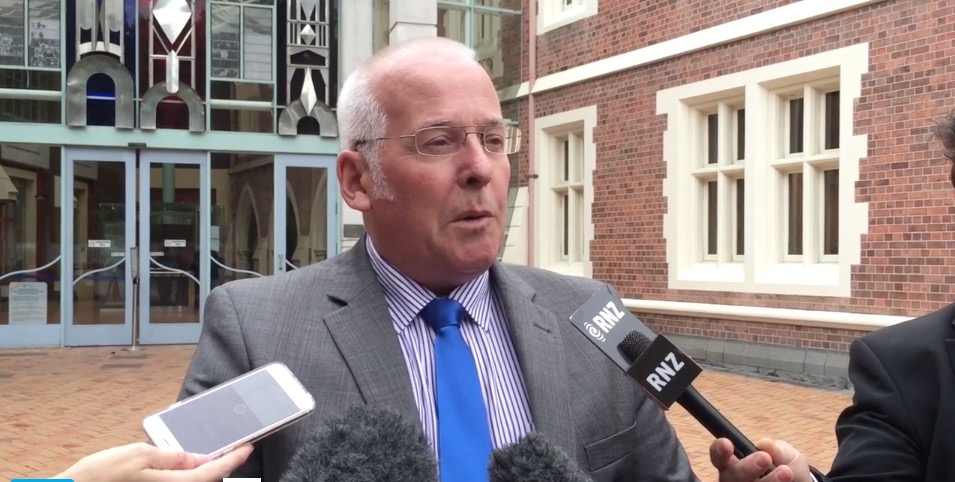
Bent Kiwi cop Andy Lovelock outside Auckland’s High Court, gloating about police success in the 1080 blackmail case. But Andy is still not willing to come clean on the dodgy clandestine police searches on innocent people’s properties – We are of the opinion that Lovelock and his police mates lied to the judge when seeking the warrants and are now trying to hide the fact.
In that interview McKinnel is scathing of police, reserving special criticism for one officer in particular, Detective Superintendent Andrew Lovelock, the man latterly charged with the oversight and conduct of the Pora case, in particular following the Privy Council decision.
In yet another video, this one available on the New Zealand Heralds website (here), McKinnel, whilst avoiding specifics, admits that as far as he and others involve in the Pora case are concerned the payment of compensation is not an end to the matter; that now is the time to start digging even further; that the root cause of these injustices and the difficulties in later obtaining the truth from police is a huge problem that needs to be dealt with once and for all.
Of course whilst McKinnel was doubtless cautious when asked for an explanation for Andrew Lovelocks outrageous behavior, LF and others that have been following Lovelock and other cops like him have already place on public record some of the issues. One website has even gone so far as to spell it out:
By his own admission, Auckland Detective Superintendent Andrew Lovelock (shown followed by his lawyer) ‘zealously’ protects the reputation of the NZ police. This eager ambition and a Machiavellian approach to his ends have made him a darling in a hierarchy which thrives on unbridled loyalties. Consequently, Lovelock has become a point man for police reactions to alleged police abuse, complaints to the Independent (sic) Police Conduct Authority and for media comment.
Det. Super Lovelock portrays himself as the voice of independent inquiry and logic. Unfortunately, Lovelock routinely gets elementary facts wrong. Fortunately, his factual misrepresentations always fall on the side of the coppers. As in 2012 when Lovelock’s investigation into the police shooting of Lachan Kelly-Tumarae determined the killing was justified. Lovelock took a year, saying his inordinate delay was out of the necessity to be ‘meticulous’. The meticulous Lovelock announced Tumarae had fired a shotgun at police. He declared the death certificate was wrong to state Tumarae died immediately from the police inflicted wounds. He appeared on Close-up to say Tumarae had been shot once, arguing the other “12 holes” in Tumarae’s clothes were from “cigarette burns, tears” and from forensic testing. He was later forced to concede these were all ‘errors’ despite his claimed meticulous approach to facts but insisted his consequent conclusion the police shooting was justified was still valid.
Four years ago, then Police Commissioner Howard Broad appointed Lovelock to re-assess the 40 year old murders of Harvey and Jeanette Crewe in response to public pressure by the Crewe’s orphaned daughter Rochelle. Lovelock again did his best to instil ‘facts’ into this confirmed case of police corruption 40 years ago – where police Detective Inspector Bruce Hutton framed Arthur Alan Thomas for the murders. Lovelock’s truth-obliterating report in July 2014 goose-stepped over a Royal Commission of Inquiry, a Court of Appeal Review and an independent legal review into the murders.
Lovelock and his dream scheme team, mindful Thomas had long been exonerated and awarded a rare $1 million as a victim of a wrongful prosecution, audaciously found “There is significant physical evidence linking the Thomas farm in Mercer Ferry Road, Pukekawa with the murders. Notwithstanding, a re-investigation is not warranted…”. He hoped repetition of the message and the sheer weight of his 328 page report would convince. Lovelock did not determine all the prior investigations had lied. He simply concluded they were less meticulous than he, finding in his meticulous way “whilst accepting the possibility that Police Exhibit 350 may represent fabricated evidence, the Review Team believes that the available evidence does not establish with certainty that it is definitely fabricated.” That’s right; Lovelock was not certain of the definiteness.
Independent Counsel David Jones QC review of Lovelock’s report was also critical, concluding, “In my view there would have been sufficient evidence to have initiated a prosecution against Detective Inspector Hutton” adding, “The (1980) Royal Commission’s finding against him were damning and well-publicised.”
Chris Birt – the journalist who Lovelock conceded in his Report to be the definitive authority on the Crewe murders before rejecting the journalist’s research – saw his good work besmirched, and was incensed. Arthur Thomas was more understandably incensed. This topper-copper was dispensing porkies with abandon. Birt responded with an article appearing this month in North & South magazine which details to those who care that Auckland’s top “detective” is a law and reality onto himself. He considers Lovelock’s report was a devious attempt to placate Rochelle, whose greatest fear was that her grandfather may have been implicated in the unsolved crime.
Former MP Ross Meurant, a detective on the original case, called Lovelock’s report “a charade”. He warned the “rule of police” was poised to contravene the Courts authority, comparing the threat with Nazi Germany of accepting Police findings into their own conduct as the last word.
So it is that this pathological “false fact teller” and self-admitted zealot is intent in discrediting the eminent authority Birt, a Royal Commission of Inquiry and even the independent counsel who reviewed his conclusions (prior knowledge that Mr Jones QC would dispute Lovelock’s publicised findings did not deter him). “How fortunate for governments that the people they administer do not think”, wrote Adolph Hitler.
Source: http://www.kiwisfirst.com/rule-police-lovelock-affair/
Lovelock’s name actually crops up frequently, particularly whenever the police have been up to no good. One example is the case of likely unlawful and covert searches and surveillance police conducted on a Golden Bay couple, in that case the polices behavior, given time, is likely to result in yet another damages tort. In that case also, police refusing to hand over evidence that will very likely incriminate the cops involved in a scam not too dissimilar to the Red Devils case, which we all know now amounted to police having committed criminal offenses.
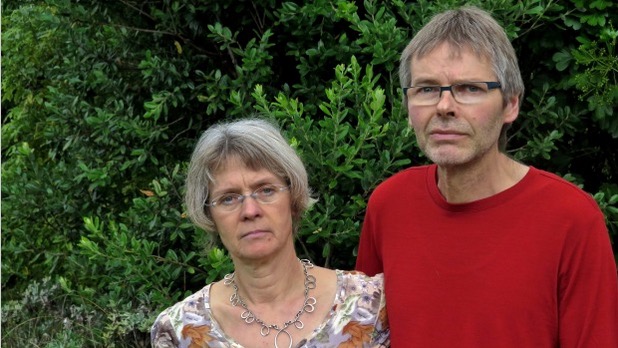
The Kleines of Golden Bay, a couple who were subjected to covert police searches and undercover cops attempting to set them up, say they may sue New Zealand police.
Team LF suspects that McKinnel & Co probably holds similar views to ourselves, that the only way forward is a Royal Commission into New Zealand Police Corruption, an all encompassing review, with unlimited powers, not the piss-weak terms of reference Margaret Bazley and Co were hobbled by.
Of course the New Zealand Government, which has historically been behind so many false prosecutions and the systemic delays in obtaining justice, are going to fight any attempt to force the issue; simply because Pora’s compensation will look puny next to the multi-million dollar claims that the government would likely be confronted with.
McKinnels reluctance is also understandable for another very good reason. New Zealand police have a long history of continuing to harass anyone that threatens their unchallenged position and power.
For his part in working tirelessly, at personal cost and no doubt risk, in pursuit of justice for Teina Pora Mr McKinnel deserves nothing less than a knighthood; the question is who in this National party government would be game enough to put his name forward?
Similarly justice campaigner Joe Karam found it an uphill battle when he was campaigning for David Bain, as did Dame Margaret Bazley during the Royal Commission, when New Zealand Police officers were eventually charged with gang rape:
Private detective checked out Dame Margaret Bazley
Saturday Apr 14, 2007
Dame Margaret Bazley has accused the men at the centre of the police rape trials of using a private investigator in an attempt to discredit her position on the Commission of Inquiry into Police Conduct.
Shortly after the inquiry began in 2004, Dame Margaret became aware that a private investigator had obtained information about the criminal activities of her former husband, whom she divorced nearly 30 years ago.
Her lawyer, John Tizard, says the investigator was acting for suspended Assistant Commissioner Clint Rickards and co-accused Brad Shipton and Bob Schollum in an attempt to discredit the commission.
It is understood that a distressed Dame Margaret took her concerns directly to Prime Minister Helen Clark, believing it was inappropriate to go to the police given that the commission was investigating them.
The information uncovered by the investigator related to Stephen Bazley – whom Dame Margaret divorced in 1978 – and his connections to the “Mr Asia” drug syndicate in the 1970s and 1980s.
Helen Clark retained her faith in Dame Margaret to head the commission, given her record as a top-level public servant in the years since.
The information about Mr Bazley has continued to be circulated, and this week Mr Tizard told the Herald “this material was originally sourced by a private investigator retained on behalf of Messrs Rickard[s], Shipton and Schollum in an attempt to discredit the commission as long ago as 2004”
Continue reading: http://www.nzherald.co.nz/nz/news/article.cfm?c_id=1&objectid=10434242
Simply put, New Zealand police will stop at nothing to get their own way, to conceal their own nefarious behaviour. They’ll use smear, false accusation and prosecution, absolutely nothing gets in their way. In doing so, especially if it’s obviously risky or illegal, they’ll often have a retired officer, often a bent cop HQ have exited through a “backdoor”, turned private investigator, do their dirty work for them.
It’s precisely because the New Zealand police have not been held to account for this behavior, for decades of corruption, their shameful abuse of the legal system and due process, that they also feel completely at home harassing anyone who dares to speak up or take them on.
So frequent is this behavior that anyone, with very little effort, could quickly locate, name and compile a list of the senior police officers who have been behind almost every cover-up, of course Detective Superintendent Andrew Lovelock is certainly to be found on such a list.
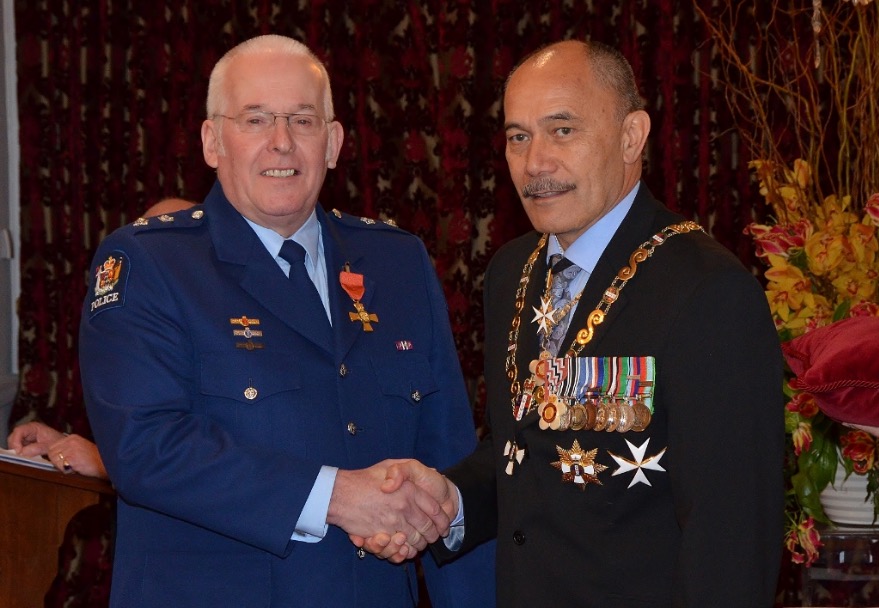
For our money, cops like Andy Lovelock, seen here receiving his award from the GG Uncle Tom handing out the Gongs, shouldn’t be included on the Queens Honours lists; more particularly if they haven’t actually been serving the public.
There is another even shorter list of men, all of which are to be found on the first list. The list is of course of those who get to attend Government house, rewarded for years of corruption and cover-up; rewarded by successive governments for ensuring that serious embarrassment was avoided.
The bottom line is that continued fear of and subservience to New Zealand’s police institutions will only result in continued and likely worsening corruption. There is no place in a free and democratic society for a public that both revile and fears their policing agencies. Where loathing and mistrust do occur there is almost always a dictatorship and that certainly appears to be the sort of power the New Zealand police currently hold and use to great effect for their own benefit.
The fact is New Zealand Police are more interesting in gamesmanship, not justice. This “gaming” of the system is a major factor in New Zealand’s justice system having gone from being moderately dysfunctional to completely unworkable in some cases; a justices system that simply put can no longer be trusted to deliver anything even resembling justice.
This reality is further evidenced in the way another infamous case was handled; not only by police, who acted corruptly, but also by the countries Chief High Court Judge at the time, Helen Winkelmann, who quite clearly acted in a manner that has undoubtedly again brought New Zealand’s Courts into disrepute.
That case is of course the police investigation and cover-up of what was undoubtedly the murder or manslaughter of 15 year old schoolboy of Stephen Dudley at West Auckland’s Kelston Boys High School.
Police handling that case had obviously thought that they could get away with their sham investigation and failure to prosecute, as had, for some strange reason, the Judge; who decided to assign the case to herself; Judge Helen Winkelmann.
Things however took a turn for the worse for both the police and Winkelmann a while back, at least as far as a releaved Dudley family were concerned, with an inquiry finally being heard this week into Stephen Dudley’s death by the New Zealand Coroner. Of course as has long been the Dudley family’s wish all involved will finally be required to give evidence on oath, including at least one cop we know is bent, the senior investigating officer in fact.
Next up on laudafinem.com; The Stephen Dudley Coronal Inquiry
Bibliography/Reference
http://www.nzherald.co.nz/national/news/video.cfm?c_id=1503075&gal_cid=1503075&gallery_id=161889
https://en.wikipedia.org/wiki/Teina_Pora
http://www.stuff.co.nz/national/75908951/secret-police-search-in-1080-blackmail-case-leaves-golden-bay-couple-in-shock
http://www.stuff.co.nz/nelson-mail/76001084/public-explanation-demanded-for-secret-1080-search
https://www.reddit.com/r/newzealand/comments/415iyh/secret_police_search_in_1080_blackmail_case/?
http://www.mandurahmail.com.au/story/2984743/rebels-bikie-arrested-following-golden-bay-drug-raid/
http://www.stuff.co.nz/nelson-mail/68779545/police-behaviour-in-red-devils-gang-case-possibly-criminal-says-judge
Burglary isn’t the only Crime New Zealand’s Police choose to ignore
http://www.nzherald.co.nz/nz/news/article.cfm?c_id=1&objectid=11658496
http://www.nzherald.co.nz/nz/news/article.cfm?c_id=1&objectid=11657829
http://www.nzherald.co.nz/teina20pora/search/results.cfm?kw1=teina%20pora
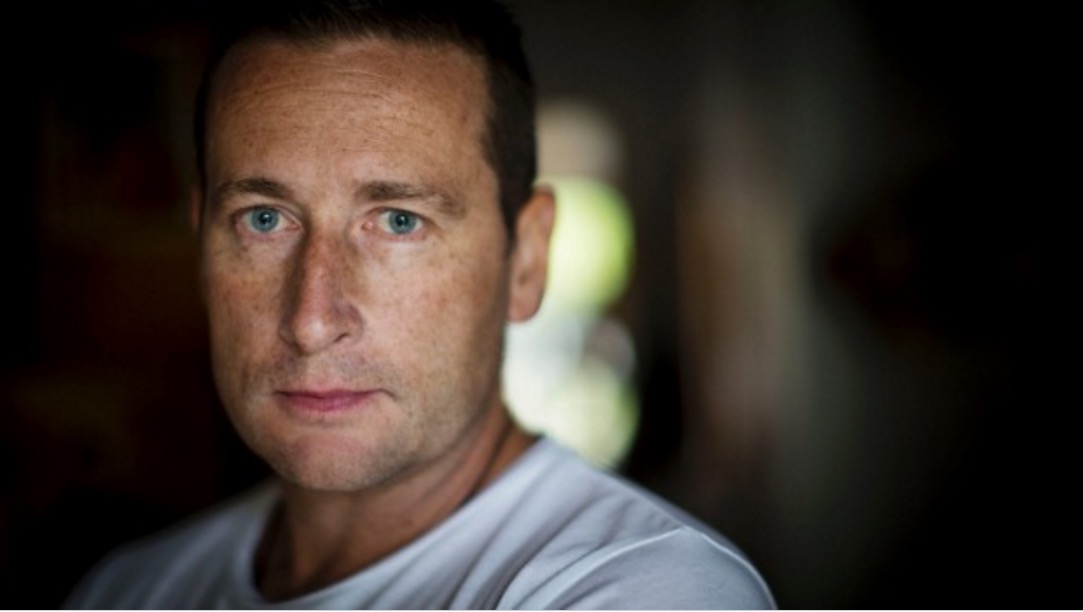
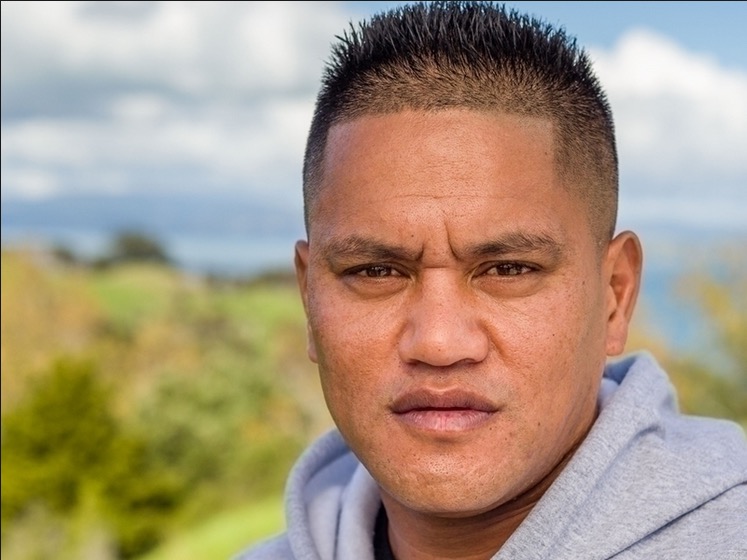
9 Comments
The root of the problem is police target young people who have no experience dealing with the police or the court system. Children are taught not to lie and own up to their mistakes, something that is taken for granted to further careers of notoriously corrupt police.
Until basic law is taught at the high school level then we leave those young adults at risk of being taken advantage of by pleading guilty even when their is little to no evidence. Taking deals and pleading guilty to certain charges while others are dropped rather then going through the process and pleading a case. Too often are people put before a Judge expecting a just and fair outcome to be slapped with generic terms and sentences while the rich with fancys lawyers are getting off scot free.
It’s not just police, fines department does the same and uses interns and not Judges to enforce unlawful collection. The court system is a joke and the scary thing is that despite all this we rely on Judges and lawful process to keep the GCSB and NZSIS honest. Two intelligence entities who work extremely close to the corruption plaguing other government agencies. So the question remains why are the Ministers so incapable of passing law and keeping their agencies free from this sort of behaviour? (because they gain from it)
It’s common knowledge that Winkelman was handpicked for the job. The fact is, in many cases before the New Zealand Courts, the prosecution hand picks judges, the habit starting around two decades ago. It’s often accepted that justice is hard come by in New Zealand’s courts. Even honest lawyers will hold that view.
The failure of the Kiwi Court system is largely down to police corruption, which is why we suspect that Kiwi Barrister Russell Fairbrother, when in Parliament, held the view that New Zealand would be well served by a more european model, wherein the Court has the authority to adopt a more common sense inquisitorial role, i.e. having the power to investigate and look for evidence itself.
There are of course other reasons for the failure of New Zealand’s courts. Judges looking after each other when serious bias occurs or mistakes made; court administrators, such as registrars, acting corruptly on behalf of third parties such as the police or prosecution, these are but some of the ways in which the courts function and or impartiality can be derailed or compromised.
In the absence of justice, and in the absence of the role once played by the United Kingdoms Privy Council, New Zealanders will clearly need to start looking elsewhere. In what we believe to be a first a litigant has done exactly that, taking her case to the United Nations, where not only the facts but any failure of the court will be under the microscope.
The Dudley case would have been long buried had the family not been advised to pursue a coronal inquiry; an inquiry that the New Zealand police carefully tried to avoid.
Knowing the depths to which the police and courts have gone to seemingly protect a school, a handful of rugby coaches from having to pay compensation and protect a rugby career, it is our view that it will only be when the Dudley case is removed from New Zealand, perhaps to the United Nations, that Justice will finally be served.
As for the polices appalling behaviour in the Pora case, this should only serve as a lesson for all New Zealanders who desperately cling onto the notion that all is well with the New Zealand justice system. There have been inquiries, Arthur Alan Thomas, Peter Ellis, Scott Watson, David Bain, Teina Pora and more, but the police have still not changed their ways. The Margaret Bazley inquiry also netted in our view netted no result; victims remaining uncompensated and New Zealand police failing to change there ways.
Both the unrepentant current Commissioner Mike Bush and senior officers the likes of Andrew Lovelock are evidence enough that police remain thoroughly dysfunctional and corrupt.
A pecuniary interests register for judges needs to happen. Too many judges ruling on cases where they have undisclosed interests in little New Zealand. Also need judges assigned only to cases where they have appropriate expertise – too many stupid/illegal decisions made because the judge is too dumb to understand the facts of the case and area of law. This is basic stuff NZ can’t get right – an international embarrassment.
You wrote: “[Winkelmann] who decided to assign the case to herself”. If she did so, it was entirely inappropriate and could be a ground for throwing out her entire judgment. Could you point to the evidence of Winkelmann’s assignment?
it was a pure and simple cover up. Bent cop Peter Litherland hid facts, destroyed evidence.
NZ desperately needs to bring back the Privy Council as the highest court. With such a corrupt Police and judiciary NZ really is a scary place. The Privy Council regularly overturned corrupt, illegal and incompetent decisions, indicating there are now probably dozens of people serving time who were innocent, setup by bent cops and judges because they are untouchable in NZ.
dissent (spelling)
In the USA for similar miscarriages of justice you get ‘zippo’. What’s it like in OZ or the UK?
With the Stephen Dudley case now being thrown wide open and the truth finally exposed, that dirty bent cop Peter Litherland needs to be arrested and charged with at minimum perverting the course of justice, and his intentional destruction of evidence. Prison is the best place for Peter Litherland. He really is scum. He is part of the bent crew of cops that is out west in Auckland. He covered up murder.